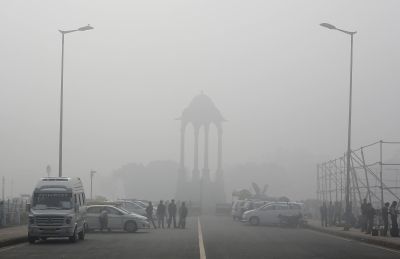 If you live in Delhi you can quit smoking, give up alcohol, go to bed early, exercise every day and eat right, but unless you also give up breathing, you can still get very sick, says Mitali Saran
If you live in Delhi you can quit smoking, give up alcohol, go to bed early, exercise every day and eat right, but unless you also give up breathing, you can still get very sick, says Mitali Saran
Approaching Delhi by train in the late 1980s was a frightening experience. You knew from miles away that it was Delhi because of the charcoal grey blanket of air over it -- a thick blanket with well-defined borders. The sky around this sludge wasn't exactly blue, but it was nowhere nearly as bad.
Inside that blanket was truly scary. Taking public transport or walking was like sucking directly on the end of an exhaust pipe. Trees coalesced out of the smog just a few feet away, like dim shaggy ghosts. At Diwali, and on winter nights, the streets looked like scenes out of one of those disaster movies where the planet has died, mankind has evacuated, and survivors make brief landings in hazmat suits with powerful torches to retrieve corpses. (The soundtrack, however, was pure wedding brass band -- honking is a prophylactic.)
The particulate matter in the city was then 186 micrograms per cubic metre.
Yet -- and this is scariest of all -- Delhi lived in this poisonous soup without noticing it much. Every second kid had asthma, everyone had some kind of allergy, lots of people had heart attacks and cancer, and the evening news pollution watch often showed Delhi in the "warning" or "emergency" categories, but somehow the average citizen was not screaming blue murder about the air.
Someone noticed, though, and things improved with emission standards on cars and the introduction of compressed natural gas in the early 2000s. You could see finally trees before you banged your nose into them. The black cloud over Delhi upgraded itself to a sort of revolting brown, the kind of colour in the first spurt of water that comes out of a long-unused tap.
Then the inevitable happened. We got ever more people, ever more cars, ever more diesel, ever more poorly regulated industrialisation. Today the air quality has deteriorated visibly, helped along by wild amounts of construction.
You get the occasional blue sky, but the haze is getting worse, not better, than it was. The Supreme Court noted in July this year that the particulate matter is now 711 micrograms per cubic metre.
It's a wonder we haven't all keeled over. Yet.
Turns out that if you live in Delhi you can quit smoking, give up alcohol, go to bed early, exercise every day and eat right, but unless you also give up breathing, you can still get very sick.
Our air puts us at risk for a host of health crises, from bronchial allergies to cardiac problems to lung cancer. This is something that most of us know at heart, but it always helps to have an institution dig it out of the back of our minds, pack it with figures, and put a scientific stamp on it.
That's why the World Health Organisation's International Agency for Research on Cancer report on air pollution, which came out a few days ago, is so arresting. It reaches some harrowing conclusions.
To wit, breathing in Delhi -- and in most of the metropolises and booming smaller towns in India -- is very much like dosing your body with UV rays, tobacco, or plutonium. It's carcinogenic. Again: breathing in Delhi can cause cancer.
A separate study in Italy shows that established standards for safe particulate matter may actually be inadequate. It finds that spikes in pollution levels cause spikes in cardiac events, and that cardiac patients appear to react at lower levels of pollution than those considered safe at present.
It's hard to understand why we don't, as a society, demand healthy air, soil and water quality as a fundamental right, when we claim to aspire to the good things in life. It's as if we are unable to join the dots between environmental degradation and threats to our own survival, health, and quality of life.
In recent times India's environment ministry has been widely seen as the bad guy, getting in the way of industrial projects that would provide jobs and sustenance to people. But evaluating environmental concerns depends entirely on your time frame. In a five-year span, nothing looks dire. Think about 50 years, or a hundred, and the picture changes.
We may get better at minimising the effects of natural disasters, as the Odisha government admirably did when cyclone Phailin hit India; but we are also needlessly contributing to tragedy, as we saw when swollen rivers in Uttarakhand swept away houses built right up to the water's edge.
Delhi can do something about its pollution, if only government, industry and citizens make the connection between air quality and wellness, health bills and productivity. Should prosperity equal lung cancer?
Meanwhile, this Diwali, consider gifting your loved ones a festive gas mask.
Image: Vendors selling drinks stand beside vehicles near the India Gate war memorial on a smoggy day in New Delhi ' Photograph: Adnan Abidi/Reuters












 © 2025
© 2025